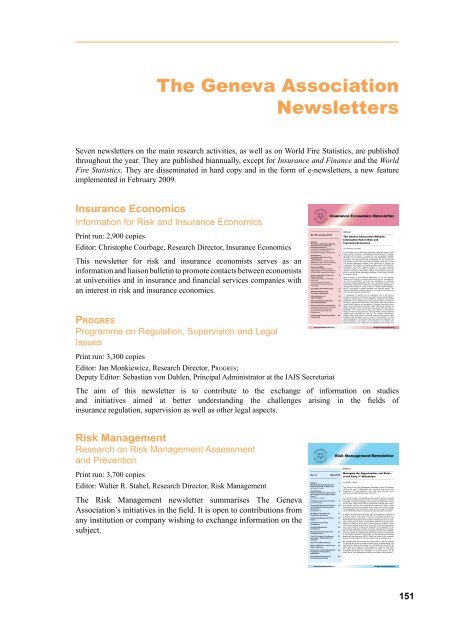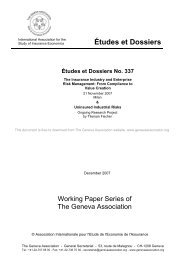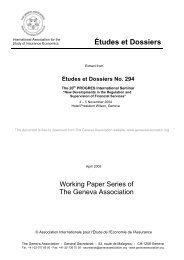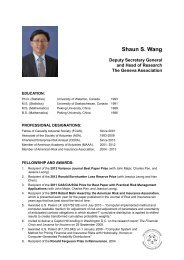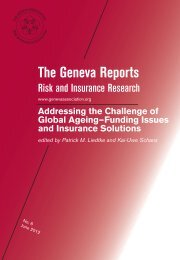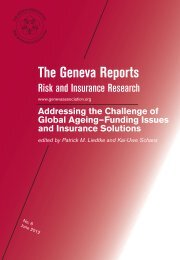Compendium of Publications - The Geneva Association
Compendium of Publications - The Geneva Association
Compendium of Publications - The Geneva Association
You also want an ePaper? Increase the reach of your titles
YUMPU automatically turns print PDFs into web optimized ePapers that Google loves.
<strong>The</strong> <strong>Geneva</strong> <strong>Association</strong><br />
Newsletters<br />
Seven newsletters on the main research activities, as well as on World Fire Statistics, are published<br />
throughout the year. <strong>The</strong>y are published biannually, except for Insurance and Finance and the World<br />
Fire Statistics. <strong>The</strong>y are disseminated in hard copy and in the form <strong>of</strong> e-newsletters, a new feature<br />
implemented in February 2009.<br />
Insurance Economics<br />
Information for Risk and Insurance Economics<br />
Print run: 2,900 copies<br />
Editor: Christophe Courbage, Research Director, Insurance Economics<br />
This newsletter for risk and insurance economists serves as an<br />
information and liaison bulletin to promote contacts between economists<br />
at universities and in insurance and financial services companies with<br />
an interest in risk and insurance economics.<br />
PROGRES<br />
Programme on Regulation, Supervision and Legal<br />
Issues<br />
________________________<br />
No. 65, January 2012<br />
________________________<br />
Editorial<br />
<strong>The</strong> <strong>Geneva</strong> <strong>Association</strong> Website:<br />
Information Hub in Risk and<br />
Insurance Economics<br />
Christophe Courbage highlights the<br />
functionality <strong>of</strong> <strong>The</strong> <strong>Geneva</strong><br />
<strong>Association</strong> website for researchers.<br />
Invited Article<br />
A Historical View <strong>of</strong> the Term<br />
“Moral Hazard”<br />
David Rowell and Luke B. Conelly<br />
addresse the origin and the meanings<br />
<strong>of</strong> the concept <strong>of</strong> moral hazard.<br />
News from EGRIE<br />
Letter from the EGRIE President<br />
Call for Papers: 39 th 1<br />
3<br />
6<br />
EGRIE Seminar<br />
SCOR-EGRIE Awards and Winners<br />
<strong>Geneva</strong> <strong>Association</strong> Prizes and 9<br />
Research Grants<br />
Call for Submissions: Ernst-Meyer<br />
Prize 2011<br />
Call for Papers: <strong>The</strong> <strong>Geneva</strong><br />
<strong>Association</strong>/IIS Research Awards<br />
Partnership ...<br />
Ernst-Meyer Prize Winner 2010 10<br />
Activities Supported by<br />
12<br />
<strong>The</strong> <strong>Geneva</strong> <strong>Association</strong><br />
Other Seminars and<br />
15<br />
Calls for Papers<br />
Recent <strong>Publications</strong> Related to 18<br />
Insurance Economics<br />
<strong>Geneva</strong> <strong>Association</strong> <strong>Publications</strong> 19<br />
Financing Long-Term Care in Europe<br />
<strong>The</strong> Essential Role <strong>of</strong> Insurance<br />
Services for Trade Growth and<br />
Development<br />
Forthcoming <strong>Geneva</strong> <strong>Association</strong> 24<br />
Conferences<br />
Print run: 3,300 copies<br />
Editor: Jan Monkiewicz, Research Director, Progres;<br />
Deputy Editor: Sebastian von Dahlen, Principal Administrator at the IAIS Secretariat<br />
Editorial<br />
………………………………………………………………………………….<br />
<strong>The</strong> <strong>Geneva</strong> <strong>Association</strong> Website:<br />
Information Hub in Risk and<br />
Insurance Economics<br />
………………………………………………………………………………….<br />
by Christophe Courbage +<br />
In this modern era <strong>of</strong> information technology, ideas and research flow<br />
easily among individuals, organisations, companies, and countries,<br />
spurring further interest in easy-to-find and qualitative available<br />
information on all sorts <strong>of</strong> subjects on the World Wide Web. Insurance<br />
economics, risk management and related fields are not spared from<br />
this constant drive to new and expert knowledge. With this in mind,<br />
<strong>The</strong> <strong>Geneva</strong> <strong>Association</strong> decided a few years back to improve the<br />
functionality <strong>of</strong> its website, by making a certain amount <strong>of</strong> information,<br />
publications and other materials related to risk and insurance<br />
economics publicly and freely available and accessible. For that<br />
purpose, <strong>The</strong> <strong>Geneva</strong> <strong>Association</strong> created a virtual library containing,<br />
so far, more than 4,300 documents accessible in many ways, including<br />
via a search engine.<br />
Many activities <strong>of</strong> <strong>The</strong> <strong>Geneva</strong> <strong>Association</strong>, if not all, stimulate<br />
research and thinking in insurance economics and risk management,<br />
not only by academics, but also by researchers in insurance<br />
companies, public organisations and other interested parties in the<br />
field. Indeed, between the conferences it organises, the publications it<br />
develops, the research it carries in-house or through expert networks,<br />
and its involvement in global economic and financial issues, <strong>The</strong><br />
<strong>Geneva</strong> <strong>Association</strong>’s original objective to promote and stimulate risk<br />
and insurance research is widely met.<br />
To strengthen its specific role as information hub in the field <strong>of</strong><br />
insurance economics, <strong>The</strong> <strong>Geneva</strong> <strong>Association</strong> has recently decided to<br />
expand its virtual library on the website to include all the articles<br />
published in its two leading journals, <strong>The</strong> <strong>Geneva</strong> Papers on Risk and<br />
Insurance—Issues and Practice and <strong>The</strong> <strong>Geneva</strong> Risk and Insurance<br />
Review. Both journals are published by Palgrave Macmillan which<br />
agreed that <strong>The</strong> <strong>Geneva</strong> <strong>Association</strong> could make freely available all<br />
articles published in the two journals three years after their date <strong>of</strong><br />
publication. This means that to date, past issues <strong>of</strong> <strong>The</strong> <strong>Geneva</strong><br />
Papers on Risk and Insurance from January 1976 to October 2008 are<br />
available and accessible for free on <strong>The</strong> <strong>Geneva</strong> <strong>Association</strong>’s<br />
website. Every three months, a another issue <strong>of</strong> the journal is made<br />
available. This represents so far a total <strong>of</strong> 1,209 articles. <strong>The</strong> first<br />
articles published in <strong>The</strong> <strong>Geneva</strong> Papers are worthwhile reading for all<br />
those interested in the history <strong>of</strong> the discipline. It is always very<br />
instructive to read past contributions <strong>of</strong> outstanding economists in the<br />
<strong>The</strong> aim <strong>of</strong> this newsletter is to contribute to the exchange <strong>of</strong> information on studies<br />
and initiatives aimed at better understanding the challenges arising in the fields <strong>of</strong><br />
insurance regulation, supervision as well as other legal aspects.<br />
Risk Management<br />
Research on Risk Management Assessment<br />
and Prevention<br />
Print run: 3,700 copies<br />
Editor: Walter R. Stahel, Research Director, Risk Management<br />
<strong>The</strong> Risk Management newsletter summarises <strong>The</strong> <strong>Geneva</strong><br />
<strong>Association</strong>’s initiatives in the field. It is open to contributions from<br />
any institution or company wishing to exchange information on the<br />
subject.<br />
Editorial<br />
_________________________ ..................................................................................................................<br />
Managing the Opportunities and Risks<br />
No. 51 May 2012<br />
_________________________ <strong>of</strong> the Early 3rd Millennium<br />
..................................................................................................................<br />
Editorial<br />
Managing the Opportunities and<br />
Risks <strong>of</strong> the Early 3 rd Millennium<br />
by Walter R. Stahel<br />
Guest Editorial<br />
Climate Liability Risk: Will it be the<br />
Next Chapter in the Global “Blame<br />
Game”?<br />
by Richard H. Murray<br />
<strong>The</strong> Value <strong>of</strong> Insurance to Society<br />
by Kathrin Hoppe<br />
<strong>The</strong> UN Shift from Social Research<br />
to Protecting the Environment to<br />
Governance<br />
by Meghan Orie<br />
New Major <strong>Publications</strong> by<br />
<strong>The</strong> <strong>Geneva</strong> <strong>Association</strong><br />
Forthcoming Books and Call for<br />
Papers<br />
<strong>The</strong> <strong>Geneva</strong> <strong>Association</strong><br />
Conferences<br />
Past Risk Management<br />
Conferences<br />
Miscellaneous Information and<br />
Prevention News<br />
<strong>The</strong> CR+I Project <strong>of</strong> <strong>The</strong> <strong>Geneva</strong><br />
<strong>Association</strong>: Climate Risk and<br />
Insurance<br />
<strong>The</strong> ART <strong>of</strong> CROs Networks<br />
Books, <strong>Publications</strong>, Articles and<br />
Papers Received<br />
Summary <strong>of</strong> the Risk Management<br />
Programme <strong>of</strong> <strong>The</strong> <strong>Geneva</strong><br />
<strong>Association</strong><br />
Forthcoming Conferences <strong>of</strong><br />
<strong>The</strong> <strong>Geneva</strong> <strong>Association</strong><br />
by Walter R. Stahel +<br />
This issue <strong>of</strong> the Risk Management Newsletter looks at paradigm<br />
shifts in the early 3 rd 1<br />
Millennium and devotes a large part to the<br />
6 emergence <strong>of</strong> quasi-regulatory risks. We hope you will enjoy<br />
reading it and look forward to your comments.<br />
9<br />
12<br />
17<br />
18<br />
19<br />
20<br />
21<br />
22<br />
25<br />
27<br />
28<br />
30<br />
In a number <strong>of</strong> polls, risk managers <strong>of</strong> all economic sectors are asked<br />
each year to list the top risks. For 2012, economic imbalances, societal<br />
inequalities, increased regulation and growing competition are among<br />
the top risks. Other areas cited by respondents included data privacy<br />
and security threats, the competition for talent and labour, better<br />
forecasting and scenario analysis, solar storms—but climate change<br />
has disappeared as a major threat; some polls also see an elevated<br />
role for Chief Risk Officers. <strong>The</strong>se priorities are also valid for insurers. 1<br />
In addition to these annual risk polls, there exist longer-term hazards <strong>of</strong><br />
a dormant nature, such as the shift from an industrial economy to a<br />
circular economy in the West, a shift <strong>of</strong> economic power from the<br />
North-Western Hemisphere to the Southern Hemisphere—China, India,<br />
Latin America, South Africa and Southeast Asia; the economic development<br />
<strong>of</strong> Siberia and the Arctic Ocean being the exception <strong>of</strong> this<br />
trend. Some hazards are linked to the growth <strong>of</strong> the world population,<br />
such as the need to increase food production, the competition for flat<br />
land between agriculture, industry and urban development; the competition<br />
for water by the same demand categories and the choice between<br />
economic growth and safeguarding the natural capital, i.e. biodiversity<br />
or the “Global Commons”—the oceans and the atmosphere, including<br />
greenhouse gas emissions (GHG). Others are linked to the increasing<br />
density <strong>of</strong> the population at certain hot spots, such as coastal plains.<br />
But whereas these developments are on the radar <strong>of</strong> most risk experts,<br />
this editorial will look at a number <strong>of</strong> lesser known “paradigm shifts” that<br />
have become visible at the change to the 3 rd Millennium and which the<br />
editor believes will shape the next decades for insurers. <strong>The</strong>se shifts<br />
are global and represent opportunities and risks for insurance<br />
companies and society—plus synergies, if a common ground can be<br />
found; that is, if the objectives <strong>of</strong> society and economy can be married.<br />
151


